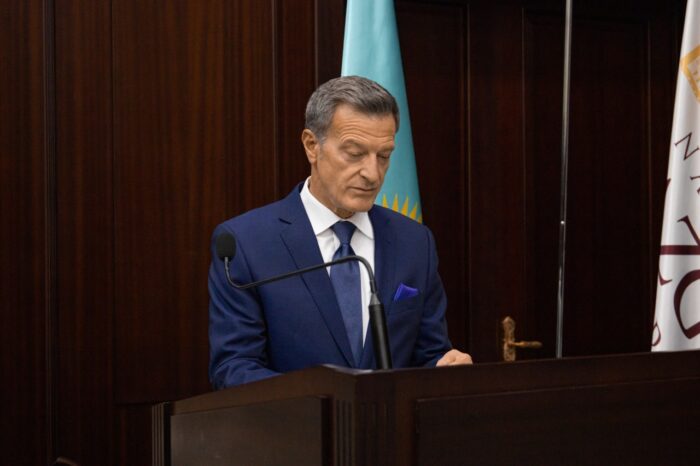NUR-SULTAN – Progressive institutional changes require highly qualified professionals who can deliver positive outcomes based on their well-informed and enlightened perspectives, and on their knowledge of international best practices, said David Russell Gallo, the Director of the AIFC Academy of Law, who spoke about the academy’s role in making international law environment more effective, in a recent interview to The Astana Times.

David Russell Gallo
Established in 2019, the AIFC Academy of Law has already enjoyed positive achievements. The academy serves as an operating pillar of the Bureau for Continuing Professional Development of the Astana International Financial Center (AIFC). It implements educational practices to develop human capital, and to create a pool of local professionals with an international outlook. To date, there are more than 5,000 people in Kazakhstan and abroad who have participated in BCPD and Academy professional training programs, and have upgraded their skills and expertise.
According to Gallo, the AIFC is positioned as a global center for business and finance, and has made substantial progress in connecting the economies of Central Asia, the Caucasus, EAEU, West China, Mongolia, Middle East and Europe. Therefore, professionals from neighboring countries are benefiting from the education opportunities that we provide in the areas of international law, trade, and commercial transactions.
“The Academy is a modern provider of legal educational services within the AIFC,” Gallo explained the role of the Academy. “Training courses, certificate programs, and various other learning and development activities are conducted both online, via digital platforms, and in a traditional live classroom setting. Thus, this model of education provides broad access to participation, without geographic limitations. Furthermore, language should not be a barrier to learning. Accordingly, many of our activities are translated into other languages to supplement our core English language courses.”
The educational services seek to take learners to new levels of knowledge awareness, and to develop their practical skills.

Photo credit: Ospan Ali.
“The Academy makes a significant effort to give local and regional legal practitioners, in particular, an opportunity to learn best international practices related to their area of interest and professional duties. From a long range perspective, this approach creates a pool of personnel who are qualified to contribute to the implementation of public and private reforms,” added Gallo.
While a majority of courses are designed for the continuing professional development of lawyers and business managers whose jobs have substantial legal content, the Academy also focuses on law students – the future lawyers. The Academy offers an international summer internship program where students can gain knowledge about the AIFC legal framework, earn valuable on-site work experience, and form important relationships for purposes of networking and future employment opportunities. In 2020, the AIFC Academy of Law launched a remote AIFC Online Legal Internship Program for law students and fresh graduates, thus removing geographical obstacles in the face of pandemic-related travel restrictions.
“We believe that this program provides a unique learning experience, and a great opportunity to work with the legal teams within the AIFC,” he said.
Twenty-seven interns from different jurisdictions including Kazakhstan, the U.K., USA, Australia, Hong Kong, Brazil, China, India, Uzbekistan were enrolled in the AIFC Online Legal Internship Program Future Lawyers in the summer of 2020.
Gallo noted that the 2021 AIFC Online Legal Internship Program was equally successful. The interns were distributed across the AIFC Bodies and Organizations including the AIFC Authority, AFSA, BCPD, Academy of Law, Green Finance Center and Tech Hub.
“Application of digital technologies is not news in the sphere of education. However, the pandemic was the catalyst to accelerating the introduction of technology tools in the delivery of education services,” said Gallo.
Gallo believes that EdTech in Central Asia is a dynamically developing industry, and strives to meet global standards of educational delivery. Both private and public sectors are interested in the ongoing development of professional competencies within their work forces. Some online courses are tailored for state authority personnel, and specialized groups of corporate staff.
In addition, the Academy organized two judicial excellence programs in 2021 for the ongoing development of Kazakhstan judges. These sessions were developed and delivered jointly with the Academy of Justice for the Supreme Court of the Republic of Kazakhstan, and the AIFC Court. Nearly one hundred judges and other courts personnel learned international best practices in judicial administration, ethics and professional conduct, process efficiency, case management, and every-day practical skills.
